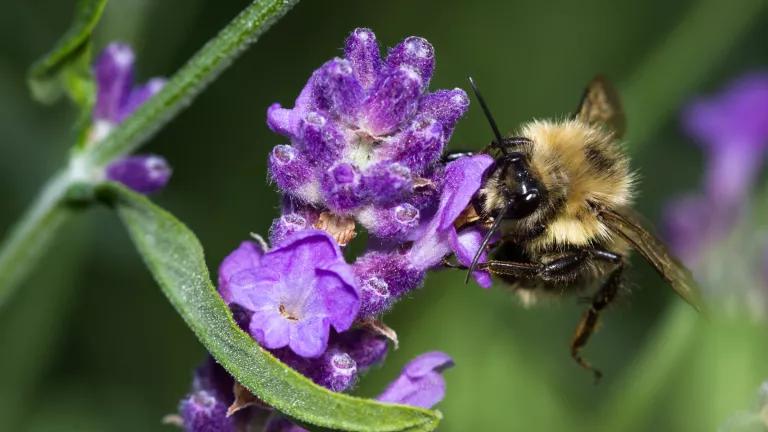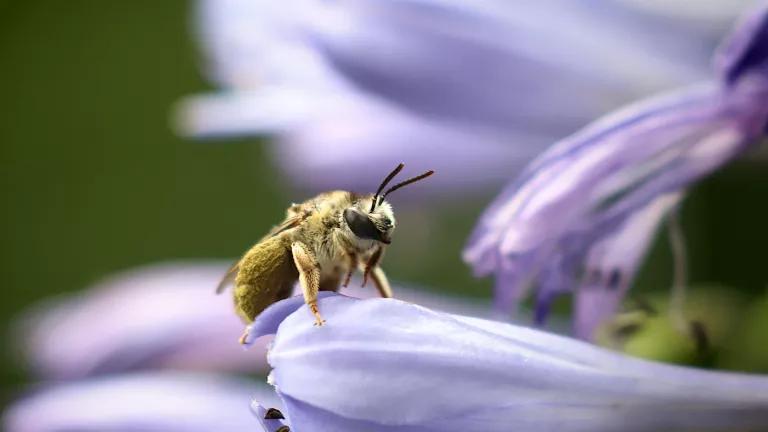Will Bees Get a Break? Neonic Bill Sent to Cal. Governor
In the six months between the AB 2146's introduction and its passage by the legislature, concerns about impacts of neonics on human health have continued to mount. It is clearer than ever that California must act.

Neonics are a leading cause of bee declines. While honey bee losses get lots of attention, native bees like this bumble bee are also disappearing.
In the six months between introduction of AB 2146 and its passage by the legislature, concerns about impacts of neonics on human health have continued to mount. It is clearer than ever that California must act. If you live in California, click here to tell Governor Newsom to sign AB 2146.
The California legislature has passed AB 2146, a bill that would prohibit lawn and garden uses of neonicotinoid pesticides, or “neonics.” It is now up to Governor Gavin Newsom to sign this critical bill into law and protect pollinators, wildlife, and California’s children from widespread exposure to these neurotoxic pesticides.
Since AB 2146 was first introduced, the need to pass this bill has become clearer than ever. Three developments, in particular, highlight increasing concern about widespread and harmful exposure.
- Widespread neonic contamination has gotten worse. According to the latest data from the California Department of Pesticide Regulation (DPR), 93% of surface water samples in Los Angeles, [other], counties contain a neonic—up from 92% in 2019. In northern California, 67% of samples contained a neonic, a substantial increase from the 57% just a year earlier.
- Pregnant women may be especially at risk of exposure. A new study of 171 pregnant women tested, over 95% had neonics residues in their bodies. Neonics were most commonly found in Hispanic women, and neonics were detected more frequently—and at higher levels—over time. Widespread exposure among pregnant women is particularly bad news; neonics present significant risks to developing fetuses because they can interfere with the highly delicate development of the nervous system. Neonic exposure in the womb has been linked with birth defects of the heart and brain, as well as autism-like symptoms
- There is new evidence of effects of neonics on testosterone. Using data from the Centers for Disease Control and Prevention, researchers have linked neonic exposure with a 20% decrease in testosterone, fueling concern about neonics’ reproductive and hormonal effects. Similar studies also suggest possible connections between neonic exposure and changes to fat metabolism and insulin regulation, as the list of possible human health harms continues to grow.
AB 2146 is a critical component of California’s response to the neonic crisis. While DPR has proposed regulations that would purportedly cut neonic use in agriculture by 45%, the Department has not committed to taking any action on non-agricultural uses. Even if it were to start now, an administrative process could cost millions of dollars and years of staff time—time that California’s residents and pollinators simply don’t have.

Children and pets often play on lawns and in parks where neonics are applied, making lawn uses a major exposure route for these neurotoxins.
That’s where AB 2146 comes in. It prohibits harmful, unnecessary neonic use on lawns and gardens—which are typically approved at much higher rates than in agriculture and contaminate the landscapes where many endangered pollinators and millions of Californians live. Recognizing the importance of retaining options to combat harmful invasive species, the bill exempts all invasive species control by the California Department of Food and Agriculture, allows trained professionals to use neonics on fruit and nut trees (where Asian Citrus Psyllid and other harmful species can thrive), and provides a flexible DPR-controlled exemption for other emergency uses.
In the end, if AB 2146 becomes law, everyone wins—farmers, beekeepers, pollinators, and Californians themselves. That’s why 77 percent of Californians, across genders, political ideologies, and ages, support these common-sense restrictions.
If you live in California, make your voice heard: tell Governor Newsom: protect our bees, our waters, and our children and sign AB 2146 by the Sept. 30 deadline.




